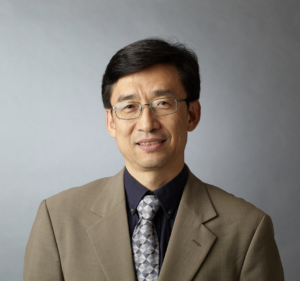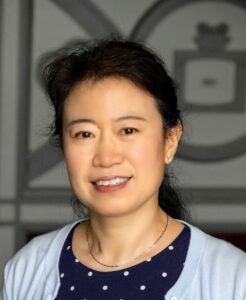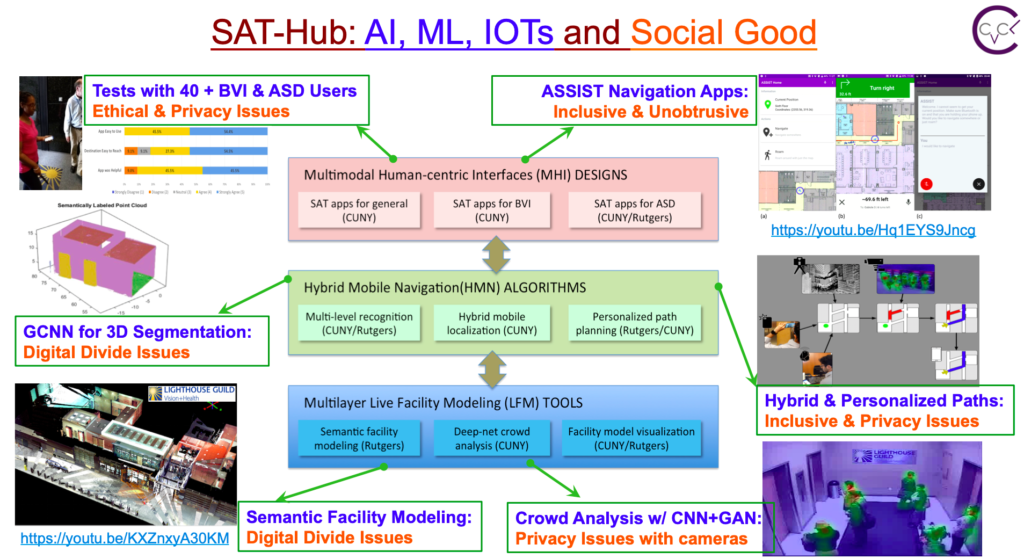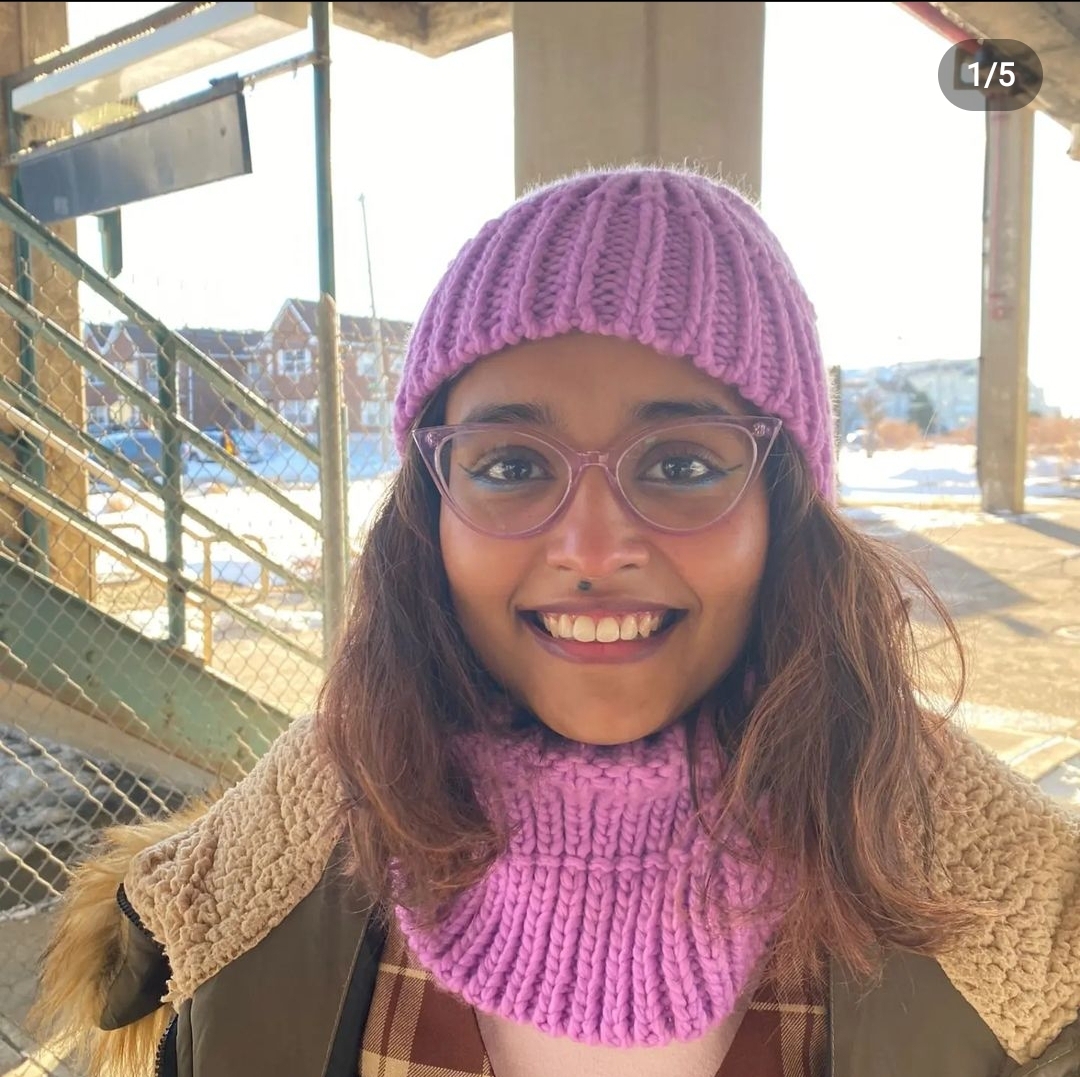
Dr. Zhigang Zhu
Using the power of Artificial Intelligence, Drs. Zhigang Zhu and Yingli Tian of the Grove School of Engineering at City College are leading ongoing interdisciplinary research to create assistive technologies for individuals who are visually impaired, hard of hearing, and have autism spectrum disorder.
Focusing on computer vision, Zhu and Tian are creating interfaces to help individuals with these disabilities interact with physical environments and other people.
One facet of their research includes using smartphones to connect to the Wi-Fi and data available around the individual. Their technology can then help the individual observe the people and objects in the environment, allowing them to avoid obstacles and understand facial expressions to better improve social communication.

Dr. Yingli Tian
To further study human behavior, Zhu and Tian have teamed up with Dr. Tony Ro, a research neuroscientist at the CUNY Graduate Center.
Zhu stressed that this application of AI is beneficial for a large group of people, as approximately 1 in 36 children have been diagnosed with autism spectrum disorder. Also, over one million people in the U.S. are blind, a number that is expected to double by 2050 due to the increase in chronic illnesses and an aging population.
“This is kind of in the balance between research and the application for the common good,” Zhu said.
Zhu and Tian have partnered with nonprofits to aid with and test out their research. Lighthouse Guild helps individuals who are visually impaired both medically and socially. Here, Zhu and Tian can partner with the organization’s Chief Research Officer, Dr. William H. Seiple, to test out their technology and get feedback from people who would benefit from it.
Another organization they are partnered with is Goodwill. Their New York and New Jersey thrift stores employ people with disabilities such as autism. Through Zhu and Tian’s research and the specific job training that Goodwill provides to these individuals, they are able to test apps that will help young people with autism perform their job.
Zhu and Tian also have hardware to assist those with disabilities, such as a cane that would vibrate to let blind users know if there are obstacles in the way or help them find their way to their desired location.
Another aspect of their research is their project, SAT-Hub: Smart and Accessible Transportation Hub for Assistive Navigation and Facility Management, funded by NSF, DHS, ODNI, and industry, including Bentley Systems, Inc., in collaboration with Rutgers, Lighthouse Guild, Goodwill, and NYC government agencies. This would make major transportation hubs in New York City more accessible with little infrastructure changes. Tian expressed the difficulty of navigating a large transportation hub like an airport for an able-bodied person, let alone someone with a disability.
 By using both cyber and physical infrastructures of the transportation area, they are hoping to provide those with disabilities more location-awareness and personalized ways to navigate the area. This includes beacons to alert people of where they are and where to go, as well as both 2D and 3D cameras, like RGBD cameras, that sense depth and recognize objects.
By using both cyber and physical infrastructures of the transportation area, they are hoping to provide those with disabilities more location-awareness and personalized ways to navigate the area. This includes beacons to alert people of where they are and where to go, as well as both 2D and 3D cameras, like RGBD cameras, that sense depth and recognize objects.
With the help of their colleague, Zihao Zhang, an urban planner from the Bernard and Anne Spitzer School of Architecture, they are able to map out locations using Google Streetview. For example, they mapped out the vegetation coverage and amenities such as benches in different areas of Central Park.
Zhu and Tian have also encouraged their students to engage in their research and use AI for social good. In one of Zhu’s senior design classes, he has his students create games that can be implemented in assistive technology to help people with autism. Tian explained that she partners Ph.D. students with undergraduate students to learn about coding and how to present their ideas.
When engaging his students over their research Zhu asks himself, “How can we educate and train our next students, undergraduate, graduate students to really get the awareness out doing it for the common good?”
Tian and Zhu have received about $12 million in funding for their research, including $2 million over four years from the National Science Foundation.
With AI technology becoming more advanced, some believe it will cost people their jobs, but Tian believes that just like other technological advances throughout history like the cell phone and internet, we will learn to adapt and ultimately it will make our lives easier.
“From my point of view, I always think AI is a new powerful tool for us,” Tian said. “If we use it correctly, it will do good things for us.”

Malina Seenarine is a recent graduate of Baruch College where she studied journalism and minored in theater. In addition to writing for The RICC, she’s a contributor for Baruch’s award-winning Dollars & Sense Magazine and wrote for the arts and news section of Baruch’s student-run newspaper, The Ticker. She’s also written for FSR magazine.